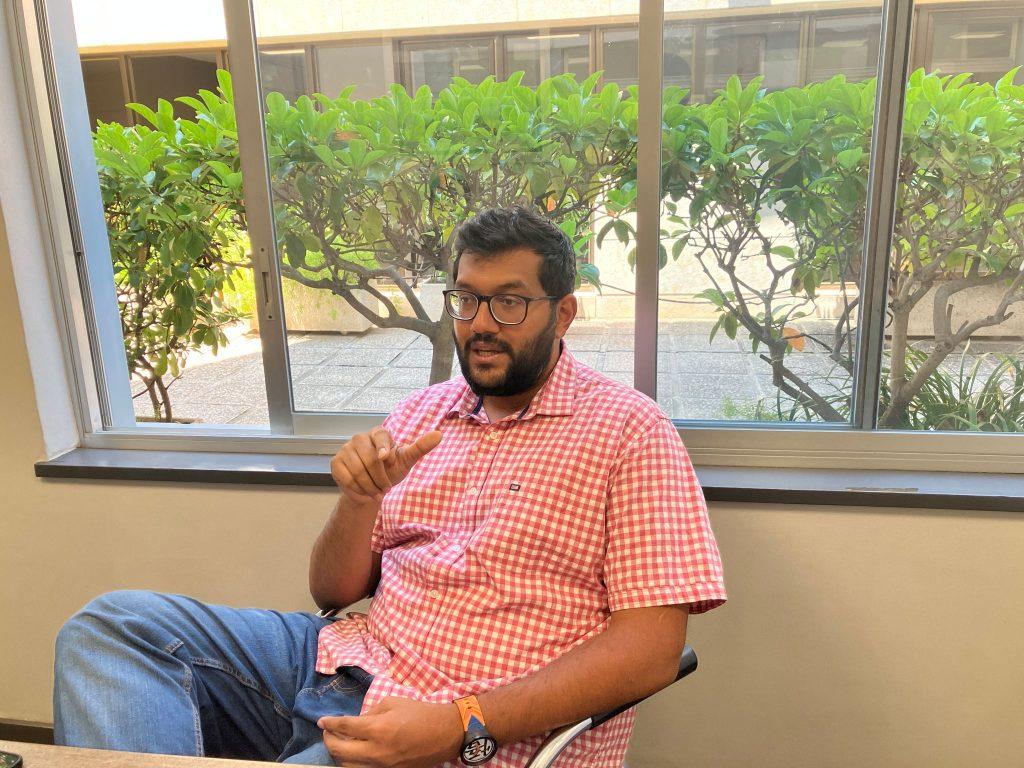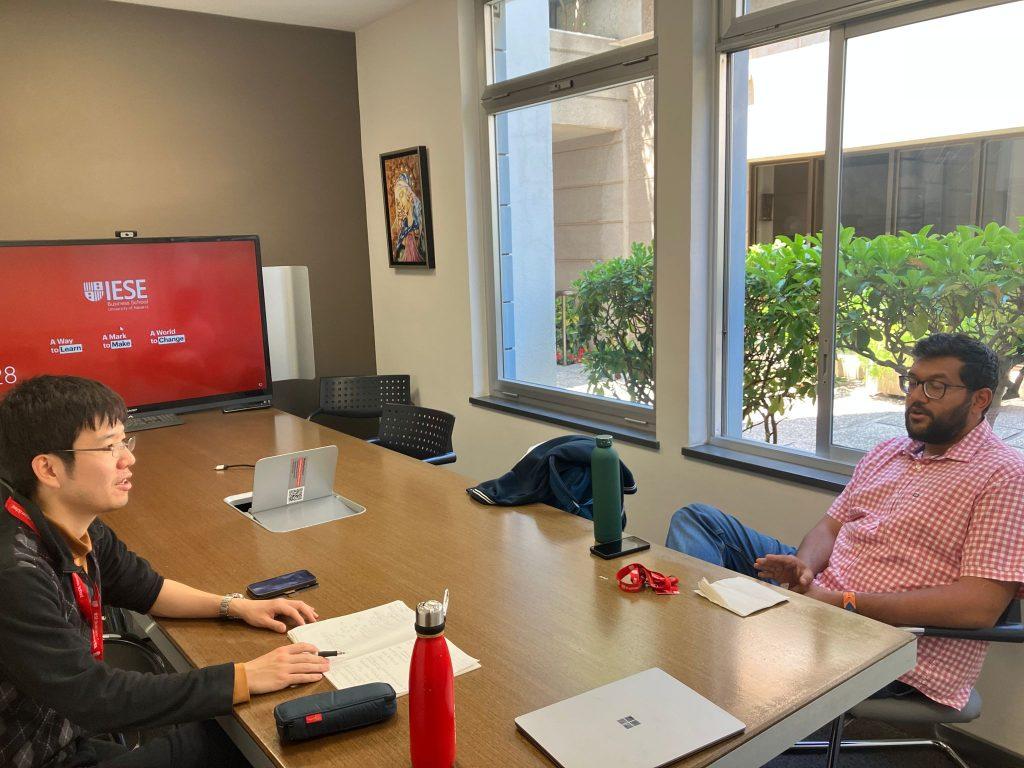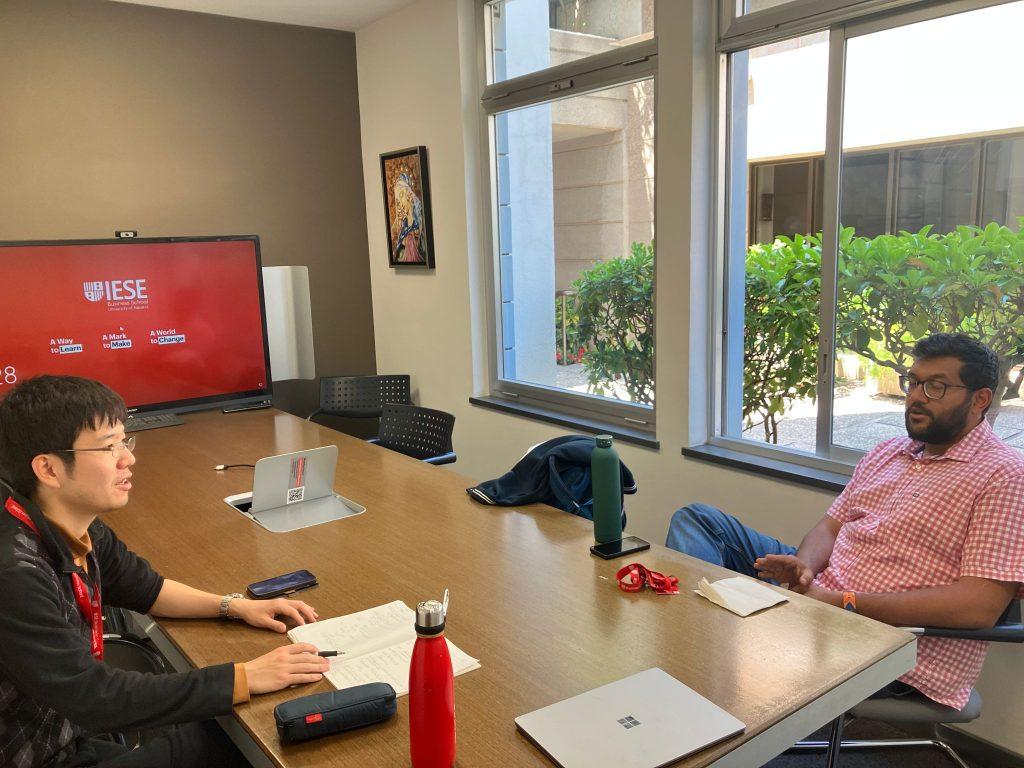IESE Class of 2025には55か国出身の学生が在籍しています(日本人は16名)。日々のケースや課外活動でクラスメートの出身国や、その国民性について知る機会は多いですが、逆に日本と日本人はどう見えているか?をクラスメートにインタビューすることで、自分たち自身への理解を深めていこう、というのが本企画の趣旨です。今回はインタビュアー(Toshi & Taisuke)がよく知る友人のDamianに話を聞きました。
Contents
日本語

お話を聞いた人
Damian D’souza(Class of 2025)
オーストラリア出身。UAE(アラブ首長国連邦)にて大手戦略コンサルティング企業、オリバー・ワイマンで勤務後、同社の社費留学生としてIESEに入学。ソーシャルインパクトに関心を持ち、いくつかのNPOで勤務経験あり。また彼は、IESEにおいてはPE/VC(Private Equity / Venture Capital)クラブの幹部を務め、ケースコンペティションやカンファレンスを主催している他、IESE Impact Fund(IESE学生が運営する投資ファンド)の共同代表でもある。
日本への印象について
Toshi:まず、日本についての率直な印象を聞いてもいいかな?
Damian:日本を訪れたことのない人にとって、まず興味を持つのは文化だと思う。食文化はユニークだし、他にも例えばニンジャとかサクラにスモウ、クールに感じるものがたくさんあるよな。僕は文化的背景までは理解していないけど、日本は美しくて文化的なインパクトの大きい国だっていうのは一般的なコンセンサスと言っていいと思うよ。それに経済についてだって、日本は面積的にはとても小さな国なのに、日本企業は世界中に展開している。(授業で習った)ゼロ金利政策とか自動車製造業も興味深い。けれども、ひとつネガティブなことを挙げるとすると、外国人にとっては日本で働くことのできる可能性がほとんどないことは残念だね。
Toshi: 日本で働いてみたいと思う?
Damian: うーん、正直なところ日本には住んでみたいけど働いてみたいとは思わないかな。だって、聞いたところだと日本の働き方は、例えば長時間労働とか組織の中の厳しい上下関係とかあまりいい話を聞かないよね。
IESEの日本人学生について
Toshi: IESEの日本人学生についてはどう思う?
Damian: 実はIESEに来て初めて日本人と知り合ったんだけど、全体的な印象はとてもポジティブだよ。賢くて、思いやりもあるし、色々な才能を持っている。何か国語も話せるとか、料理が上手いとかね。とても興味深いし、何より皆謙虚だね。
Taisuke: 何か覚えているエピソードはある?
Damian: そうだね、君たちの何人かは社費で来ていると思うんだけど、だからと言って全く手を抜いたりしないよね。例えば自分の興味や経験のためにインターンシップを探したり、授業でも積極的に発言する。
Toshi: 逆に、ネガティブな側面に気づくことはある?
Damian: 僕の意見だけど、リーダーシップをとることを恐れなくていいと思う。欧米出身の学生と比べて、アジア出身の学生にとってリーダーシップをとることはチャレンジに感じるとは思うんだけど、IESEにはもっと謙虚なリーダーが必要だと思う。君たちは一歩踏み出すべきだと思うし、その能力はあるはずだ。実際、ほんの数人で、70人以上参加したジャパントレックを運営できていた。ジャパントレックはIESEの公式のイベントでないし、誰にもやれと言われていないのに彼らはリーダーシップをとったのはすごいことだと思う。だからこそ、IESEの学生クラブに日本人のプレジデントがいないことは残念に思うよ。
Toshi: どうすれば良くリーダーシップをとることができるか、アドバイスはあるかな?
Damian:日本人の君たちを信頼しているし、他の学生に対していい影響を与えられると信じている。立ち止まって考える前に、もっとアクティブに動いた方がいいと思う。とにかく行動、何かアイデアが思いついたら、人を巻き込んでアクションを起こすべきだ。
IESEの多様性について
Taisuke: IESEの多様性についてはどう思う?同質的な環境で育って働いてきた僕らにとって、IESEってものすごく多様な環境に感じるんだけど、Damianはどうかな?
Damian: たしかに数字の面ではIESEは多様だ。出身国数、バックグランドの職歴とかね。でも表面的になって満足してはいけないと思うんだ。僕は皆の背後にあるもの、彼らの経済、文化を形作ったのは何なのかを理解したい。深く理解したいんだ。例えば、僕のあるクラスメイトが、彼の出身の東アフリカにある国のことを説明してくれた。僕はその国についてはほとんど知らなかったんだけど、すごく面白かった。同じように、日本で何が起こってるかは聞いてみたいな。日本食ディナーとかそういうイベントを開くことから始めるのがいいと思う。だってさ、僕のナイジェリア人のクラスメートは最初生の魚を食べるなんてありえないと思ってたところが、今はもう喜んで寿司を食べてるよ。もっとみんなに関心を持たせてほしい。
Toshi: 一般的な質問で悪いんだけど、日本の未来ってどうなると思う?
Damian: 日本は日本企業のおかげでしばらくは経済の一線にはいるはずだよ。しかし問題になるのは、旧い世代がちゃんと道を譲って若い世代が輝けるかだね。それに、女性の観点についてもわからない。日本の側面の多く、たとえばビジネス、食文化やシェフ、政治は男性の観点でばかり語られるじゃないか。
ダミアン自身の将来について
Taisuke: ところでさ、Damian自身の未来とかキャリアのゴールについてはどう考えている?
Damian:僕の大きなゴールは、自分の時間、お金、エネルギーを社会起業に使うことなんだ。大人になるにつれて分かったことは、教育へのアクセスはギフトなんだ。東南アジアではたくさんの人が、この世界を探索する機会を持てていない。僕の関心は子供たちにどうやってそうした教育の機会を与えられるかなんだ。
Taisuke: あわせて、Damianがこれからの世の中がどうなると思うかについて聞きたいな。これからの世の中で大事になるだろうことを3つのキーワードで表現してほしい。
Damian: なかなか難しい質問だね。だけど…一番目はコミュニケーション。大事だよね。二番目はもっとディープな関係性。SNSのせいでなんでも表面的になってしまった。人々が浅い関係しか持てていないことは大問題だよ。最後は不確実性かな。先を予測することって本当に難しい。
Toshi: これが最後の質問。来年ジャパントレック来る?
Damian: 当然!

English

IESE Class of 2025 has students from 55 countries. There are many opportunities to learn about the countries of origin of classmates and their national characteristics through daily cases and extracurricular activities, but the purpose of this project is to deeply understand about how our classmates see Japan and Japanese people. For this interview, we talked to Damian, a friend of the interviewers (Toshi & Taisuke).
About Damian
Damian D’souza, MBA candidate (Class of 2025) at IESE Business School
Damian is from Australia and worked in the UAE. He is sponsored by Oliver Wyman, a leading international management consulting firm. He is interested in social impact and has worked for several non-profit organizations. He has also taken a leadership role in the PE/VC club at IESE, organizing case competitions and conferences and serving as the president of the IESE Impact Fund.
Impression about Japan
Toshi: Tell us your honest honest impression about Japan.
Damian: Those who have never visited Japan would be curious about the culture. Japan’s food is unique, and it has interesting or unique aspects such as Ninja, Sakura, Sumo wrestling, etc. I don’t fully understand the background of those things, but the consensus is that Japan is a beautiful country with a strong cultural impact. Regarding the economy, Japanese companies have global footprints despite being a small country. Other things, such as the zero interest rate policy and lean car manufacturing, sound interesting. However, one negative thing is that, as a foreigner, there is no opportunity to work there.
Toshi:.Do you want to work in Japan?
Damian: Japan’s culture is incredibly appealing, but the demanding work culture, known for long hours and strict hierarchies, is a concern.
IESE Japanese students
Toshi: How do you view Japanese students in IESE?
Damian: IESE is my first time getting to know Japanese people. They are intelligent, respectful, and talented, with skills like speaking multiple languages and cooking very well. They are also surprisingly humble, which makes them even more impressive.
Taisuke: Do you have any specific episode?
Damian: For example, while some of you have sponsorships and don’t necessarily need to be as active, these students are still working hard, seeking new experiences through internships, and participating actively.
Toshi: Conversely, do you see any negative aspects of us?
Damian: There seems to be a hesitation among some Asian students to take on leadership roles. This might be a cultural difference compared to Western students. However, IESE thrives on humble leaders, and I believe Japanese students have the potential to excel in those roles. For example, during the Japan Trek, a group of 2-3 Japanese students took the initiative to organize a trip for over 70 people. This demonstrates the leadership capabilities of Asian students, even when it’s not an official IESE event. It’s true that there isn’t currently a Japanese president in any student club. However, I encourage you to consider stepping up and taking on leadership positions. IESE needs diverse voices, and your perspective would be valuable.
Toshi: Do you have any advice on how to have good leadership?
Damian: I trust them, and they can create better experiences for fellow students. Instead of waiting and thinking, you should take a more active role. Act, act. When you come up with ideas, organize action. You can do it.
Idea about IESE diversity
Taisuke; what do you think about IESE’s diversity? For us growing up and working in a homogeneous environment, IESE is a super diverse community.
Damian: IESE boasts a rich diversity of nationalities and backgrounds, but true understanding goes beyond mere numbers. I’m eager to delve deeper into the cultural and economic factors that shape our classmates’ experiences. For example, hearing a story about one of my classmate’s East African country, a place I previously only had general knowledge about, opened my eyes to a whole new perspective. I believe similar experiences can be had by learning more about Japanese culture. Perhaps hosting a casual event like a Japanese dinner could be a great way to facilitate this deeper understanding. Just like my Nigerian classmate, who never considered raw fish but now enjoys sushi, exposure can spark curiosity and appreciation for different cultures.
Toshi: General question. What do you see Japan in the future?
Damian: I guess Japan will still be prominent because of large companies. The question is, will young people be able to step up, and will the old generation give their way to young people? I have no idea from a female perspective. Many aspects of Japan are understood from a male perspective, such as business, cooking, and politics.
Damian’s future goal
Taisuke: By the way, what is your future or long-term career goal?
Damian: As I’ve grown, I’ve come to appreciate education as a true gift, and I’m passionate about ensuring others have the opportunity to explore the world through knowledge. That’s why I’m determined to invest my time, money, and effort in a social enterprise focused on Southeast Asia. My particular interest lies in creating educational opportunities for young children in the region.
Taisuke: I’m curious about your view of the world’s future. Could you kindly tell us three keywords that you think are important for the world?
Damian: Difficult question but… First is communication. It’s important. The second is deep relations. Nowadays, everything is superficial, such as social networks. The major problem is that people don’t have close relationships. The final thing is uncertainty. It’s hard to predict things.
Toshi: Final question. Do you want to go to Japan Trek next year?
Damian: Yes!
